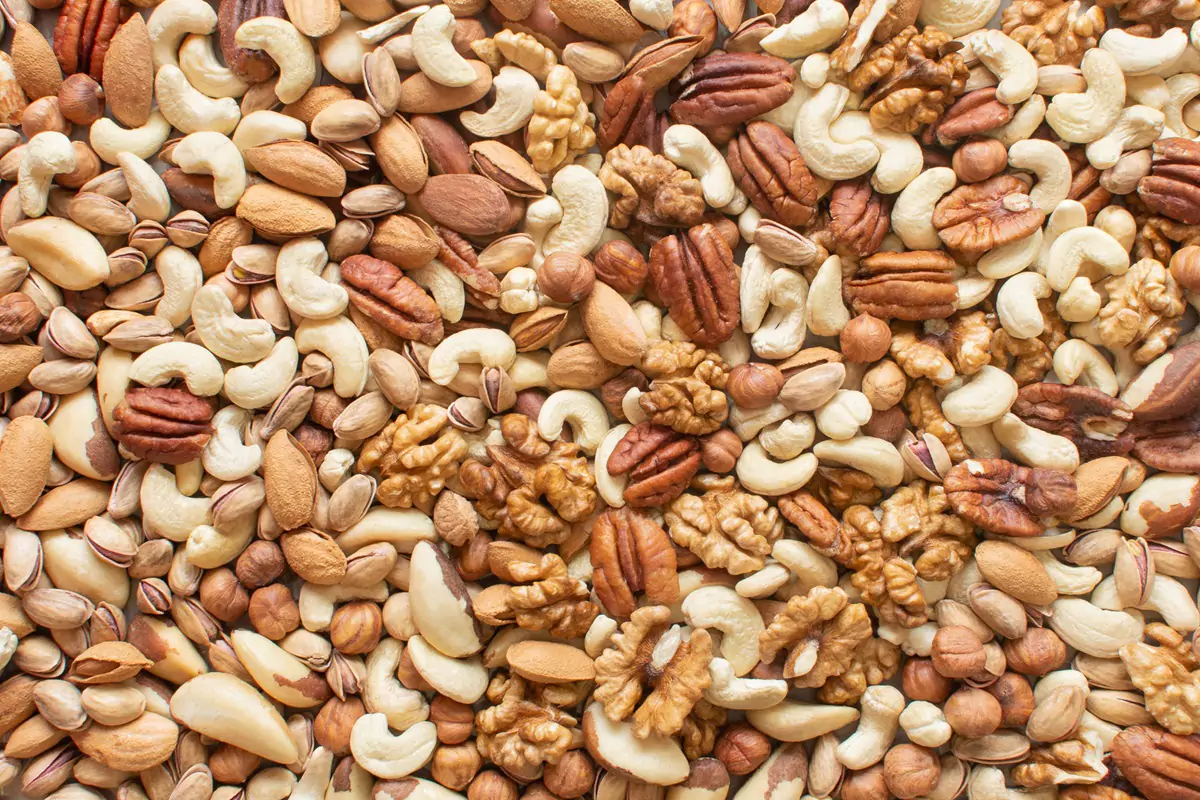





5 Best Nuts for Diabetics


Table of Contents
- Nuts and Diabetes
- What are the Benefits of Eating Nuts for Diabetes?
- 5 Best Nuts for Diabetics
- Almonds
- Cashews
- Hazelnuts
- Macadamias
- Walnuts
- SugarMD DiaVitamin and Neuropathy Support
- What Nuts should you avoid while having diabetes?
- Are There Specific Nuts That Are Better Than Others?
- SUGARMD ADVANCE GLUCOSE SUPPORT
- Recommended Serving Sizes for Diabetics
- Selection and Storage of Nuts for Diabetics
- Conclusion
- About The Author
Nuts are one of the healthiest snacks you can eat - and they can be particularly beneficial for people with diabetes. But not all nuts are created equal, and some contain more beneficial nutrition than others.
Think of the 5 best nuts for diabetics as “superfoods” for your health. In this article, we’ll cover everything you need to know about nuts, diabetes and how to choose the best nuts for diabetics. We’ll discuss the types of nuts that are best, what nutritional value each type offers, how to store and prepare them, and more. Let’s get started!
Nuts and Diabetes
Including nuts in a diabetic diet can be a great way to control blood sugar levels, provide essential vitamins and minerals, and fuel the body with healthy fats and protein. Nuts are a beneficial food item that are high in fiber, magnesium, and the healthy unsaturated fats. Eating nuts helps to provide a long-term source of energy and when eaten in moderation, can be an excellent part of a well-rounded diet.
What are the Benefits of Eating Nuts for Diabetes?
Nuts are nutrient and calorie-dense, making them a great choice for people with diabetes. They are high in protein and fiber, both of which may help slow down digestion and absorption of carbohydrates to help prevent spikes in blood glucose levels. In addition, nuts contain magnesium, which helps the body use insulin efficiently to control blood sugar levels.
Nuts are also a good source of healthy fats, including monounsaturated and polyunsaturated fats. These types of fats may help reduce cholesterol and triglyceride levels, which is important for people with diabetes. Nuts have been found to have a beneficial effect on body weight in people with diabetes. Studies suggest that as part of a healthy diet, including nuts helps to promote a healthy body weight, which can help with diabetes management.
Eating nuts can also help reduce inflammation and oxidative stress, both of which play a role in the development of diabetes and its complications. When it comes to the best nuts for diabetics, it is important to choose options that are low in added sugars or salt. Eating a handful of nuts a day can be a great addition to a diabetes-friendly diet.
Nuts can help improve insulin sensitivity, reduce inflammation, and promote a healthy body weight. They are also a good source of healthy fats, protein, and fiber. Choose unsalted and unsweetened nuts to maximize their nutritional benefits.
5 Best Nuts for Diabetics
Not all nuts are created equal, however. Some types of nuts have higher fat, fiber, and protein content than others, which can be more beneficial for people with diabetes. Here are the five best nuts for diabetics.
Almonds
Almonds are considered one of the best nuts for diabetics due to their low glycemic index and their high levels of antioxidants and healthy fats. They are also a great source of dietary fiber and protein, which can help control blood sugar levels. Almonds help to reduce cholesterol levels, which can be beneficial to those with diabetes. Almonds also offer a wide range of vitamins, minerals, and other nutrients that may help to keep diabetes under control.
Additionally, they are low in calories and high in healthy fats, making them a great addition to any diabetic diet. Research has shown that a handful of almonds a day can help to reduce the risk of developing type 2 diabetes.
Furthermore, studies have shown that almonds can help to reduce the symptoms of diabetes and help to improve glycemic control. All of these benefits make almonds an excellent choice for diabetics who are looking for a healthy, low-glycemic nut snack.
Cashews
Cashews are one of the best nuts for diabetics, as they are a good source of essential minerals such as iron, zinc, and magnesium and are also enriched with healthy fats and proteins. Cashews are a great choice for diabetics as they contain low levels of carbohydrates, as well as being naturally low in sugar.
They are also a great source of dietary fiber and have a low glycemic index, meaning that they won’t cause sudden spikes in blood glucose. Cashews are also a great source of antioxidants and have been found to be beneficial in reducing inflammation and improving cardiovascular health.
Additionally, cashews are a great choice for diabetics as they are rich in the mineral magnesium, which has been found to be beneficial in helping to regulate blood sugars. Cashews are a tasty and healthy addition to any diabetic diet, providing essential nutrients and minerals as well as aiding in maintaining blood glucose levels.
Hazelnuts
Hazelnuts known for their sweet, nutty flavor and crunchy texture, hazelnuts are an excellent choice for those with diabetes. Hazelnuts are high in healthy unsaturated fats which helps regulate blood sugar levels. They are also full of vitamins, minerals and fiber, providing a good source of nutrition for those with diabetes.
Hazelnuts are also low in carbohydrates which can help reduce blood sugar spikes. In addition to their well-rounded nutritional content, hazelnuts are also a great source of antioxidants. These are important for diabetes, as they can help reduce inflammation, which is a common issue for diabetics. The antioxidants in hazelnuts also have benefits for cardiovascular health, helping to reduce cholesterol and improve overall circulation.
Hazelnuts can be enjoyed in a variety of ways, such as in trail mix, oatmeal or as a snack. You can also pair them with other healthy foods such as fruits, vegetables and whole grains. For diabetics, hazelnuts are a great addition to your diet and can help to keep blood sugar levels in check. They are a good way to get the nutrition you need without raising your blood sugar too high.
Macadamias
Macadamias is a white kernel that is encased within a hard shell, and can be found either raw or roasted. Macadamias are also incredibly versatile, making them easy to add to a variety of dishes. Macadamias offer numerous health benefits that make them one of the best nuts for diabetics. They are relatively low in carbohydrates, with a single ounce containing just four grams of carbohydrates.
They are also a great source of healthy fats and fiber, which help to manage blood sugar levels. When combined with a healthy diet and lifestyle, macadamias can help to control diabetes and prevent its onset in those who are pre-diabetic. In addition to helping manage diabetes, macadamias are an excellent source of energy-promoting, essential nutrients.
A single ounce of macadamias contains high levels of vitamin B1 and B6, as well as magnesium, potassium, calcium, and iron. All of these nutrients help to convert the carbohydrates from food into fuel. Macadamias are also a great source of protein, with a single ounce containing two grams of protein. Macadamias are incredibly easy to incorporate into any diet, and can be eaten as a snack, added to salads and other dishes, or ground into nut butter.
The nut also pairs well with a variety of flavors, from sweet to savory, making it easy to add to a wide variety of dishes. Overall, macadamias are one of the best nuts for diabetics. Not only are they low in carbohydrates and high in healthy fats and fiber, they are also a great source of essential vitamins and minerals that can help to promote energy and healthy blood sugar levels. Incorporating Macadamias into a healthy diet and lifestyle can help to manage diabetes and prevent its onset in those who are pre-diabetic.
Walnuts
Walnuts can help regulate blood sugar levels and are a healthy source of protein, healthy fats, and other vital nutrients. Packed full of antioxidants and healthy omega fatty acids, walnuts can help protect against cell damage and oxidative stress, two of the major contributors to diabetes. Furthermore, they are a low glycemic index (GI) food, meaning they release sugar slowly, which reduces the risk of spikes in blood sugar.
Walnuts are especially beneficial because they contain significant amounts of plant-based, polyunsaturated alpha-linoleic acid (ALA), which has been found to lower the risk of type 2 diabetes. ALA helps to reduce inflammation, improve insulin sensitivity, and prevent and repair oxidative cell damage. Furthermore, a 2019 study found that walnuts may help reduce insulin resistance and improve glycemic control, making them a great option for those with diabetes.
Finally, walnuts are a great addition to a diabetes-friendly diet because they are low in calories and carbohydrates. An ounce of walnuts contains 14 grams of fat, 4 grams of carbs, and 4 grams of protein. This makes them a nutrient-dense, calorie-smart choice that offers a variety of health benefits.
SugarMD DiaVitamin and Neuropathy Support
SugarMD DiaVitamin and SugarMD Neuropathy Support 180 Capsules are dietary supplements designed to support the health of individuals with diabetes. The DiaVitamin formula is formulated to support healthy glucose metabolism and provide essential vitamins and minerals including High potency B-vitamins, Antioxidant Vitamins A, C, E,Thiamine and Selenium, while the Neuropathy Support formula is designed to help alleviate nerve pain and support nerve health.
Both formulas are made with high-quality ingredients and are carefully crafted to meet the unique needs of individuals with diabetes. Support into your daily regimen, you can help support overall health and wellness, especially for those with diabetes.
What Nuts should you avoid while having diabetes?
For diabetic people, it is paramount to be mindful about the kind of nuts they consume. As nuts are generally high in fat and calories, it is important to pay attention to the amount consumed. It is also important to choose nuts that are low in sodium and sugar. When living with diabetes, it is recommended to stay away from any kind of nuts that contain sugar as an ingredient.
This includes sugar-coated nuts like honey-roasted, glazed, and cinnamon-sugar. Nuts that contain a lot of sodium, such as salted or smoked nuts, should also be avoided. Moreover, although nuts are considered to be healthy, it is suggested to limit the intake of nuts high in saturated fat, such as macadamia nut and coconuts.
These nuts can increase cholesterol levels in the blood and can act as a trigger for diabetes-related complications. Although some of these nuts are considered to be unhealthy for diabetic people, there are still some nuts that are beneficial in managing diabetes. Cashews, pines, almonds, and walnuts are some of the best nuts for diabetics. These nuts are rich in healthy fats and protein, providing some essential vitamins and minerals for the body.
Also, due to their low glycaemic index, these nuts help to maintain a stable blood sugar level. All in all, when living with diabetes it is important to be mindful of the kind of nuts you consume. It is recommended to stay away from nuts that are high in saturated fat, sodium, and sugar. Cashews, pines, almonds and walnuts are some of the best nuts for diabetics to include in their diet.
Are There Specific Nuts That Are Better Than Others?
Diabetic people often have to make careful choices about what foods they consume. Many popular nuts are thought to be healthy, but not all are ideal for people with diabetes. Studies have indicated that certain types of nuts are especially beneficial for diabetic people. Here are the best nuts which are there specific nuts that are better than others.
Almonds: Almonds are a great choice for diabetics because they are low in carbohydrates and have a low glycemic index. Almonds have also been found to help reduce LDL cholesterol and regulate blood sugar levels. Walnuts: Walnuts are full of fiber, vitamins, and minerals. They are also rich in healthy omega-3 fats and may help reduce inflammation, which can be beneficial in managing diabetes.
Cashews: Cashews are full of fiber, protein, magnesium, and healthy fats. They are also low in carbohydrates and may help reduce levels of bad cholesterol. In addition to these five nuts for diabetics, it is also important to make sure you get a variety of other healthy foods in your diet.
Eating a wide range of fresh fruits and vegetables, lean protein, healthy fats, and whole grains can help ensure that you are getting the nutrients you need. Of course, it is important to talk to your doctor or nutritionist before making any changes to your diet. With their help and guidance, you can make sure that you are eating the best nuts for diabetics and getting the nutrition you need to stay healthy.
SUGARMD ADVANCE GLUCOSE SUPPORT
Maintaining healthy blood sugar levels can be a challenge. From carby meals to snacks and even with all the effort, it’s still not enough. That’s where SugarMD Advanced Glucose Support comes in. Our blend of traditional Ayurvedic herbs helps regulate blood sugar levels, curbs cravings, supports weight loss, boosts metabolism and energy. Endorsed by endocrinologists, this unique formula of pure, potent herbs promotes overall blood sugar health. Ideal for both pre-diabetics and Type 2 diabetics.
Recommended Serving Sizes for Diabetics
For those with diabetes, it can be difficult to make dietary changes due to the condition, but there are certain healthy nuts that can be enjoyed in moderation and help manage blood sugar levels. Below is a list of the five best nuts for diabetics and some suggested serving sizes.
- Almonds: Almonds are a good source of magnesium, which helps regulate blood sugar levels, and they contain healthy fats, protein, and dietary fiber. For diabetics, a good serving size is 1 ounce or around 23 almonds. - Walnuts: Walnuts are an excellent source of essential fatty acids and are filled with antioxidants. Eating just 1/4 cup of walnuts per day can reduce the risk of developing diabetes. For diabetics, it is suggested to eat no more than 1 ounce of walnuts a day.
- Cashews: Cashews are low in carbohydrates and contain healthy fats, protein, and dietary fiber. Eating 1/4 cup of cashews a day can help manage blood sugar levels and reduce the risk of developing diabetes.
By following the recommended serving sizes, diabetics can enjoy the benefits of the best nuts for their condition while managing their blood sugar levels. Eating nuts in moderation is essential for diabetics, as it can help balance blood sugar levels and reduce the risk of developing diabetes.
Selection and Storage of Nuts for Diabetics
When selecting the best nuts for diabetics, it is important to consider the type of nuts, their level of freshness, and how they will be stored. When it comes to type, some of the best nuts for diabetics are almonds, walnuts, and peanuts. All of these are low in carbohydrates, contain good amounts of protein, and are rich in various essential vitamins and minerals.
When selecting fresh nuts, it is important to look for ones that show no signs of discoloration or mold. Additionally, smell the nuts before buying and avoid any that smell musty, rancid, or bitter. It is also important to store nuts properly to help ensure their freshness and maximize their health benefits. To prevent the nuts from going stale, it is best to store them in an airtight container in a cool, dark place.
Additionally, it is recommended to store any nuts that have been shelled separately from their shells to keep them from absorbing any unpleasant odors. Nuts are a great source of nutrition for diabetic individuals, making them an excellent choice. To get the most out of eating nuts, it is important to consider the type, level of freshness, and how they will be stored. By doing so, diabetics can enjoy the many health benefits that nuts provide in a safe and nutritious way.
Conclusion
In conclusion, eating nuts is beneficial for people with diabetes. Eating the right kinds of nuts such as almonds, cashews, hazelnuts, macadamias, and walnuts can help to control blood sugar levels and provide good sources of trace nutrients, healthy fats, and fiber. Additionally, it is important to consider how many and how often to eat these nuts and the specific nut varieties, as these can have an impact on the effectiveness of the health benefits.
Finally, it is best to purchase nuts that are fresh and store them in an airtight container in a cool, dark place away from direct sunlight for the best taste and quality. With the right information and preparations, individuals with diabetes can incorporate nuts into their diet to improve their overall health.
About The Author
Meet Dr. Ahmet Ergin a highly skilled and dedicated endocrinologist with a passion for diabetes care. Dr. Ergin earned his medical degree with honors from Marmara University in Istanbul. He completed internal medicine residency and endocrinology fellowship at Cleveland Clinic.
Dr. Ergin is board-certified in Internal Medicine, Endocrinology, Diabetes, and Metabolism due to his vast medical expertise. He's a certified diabetes educator, author of "The Ultimate Diabetes Book," and founder of "the SugarMD YouTube channel." Dr. Ergin offers exceptional diabetes care to his patients in Port Saint Lucie, FL, helping them manage effectively.
Disclaimer: The website's disease and treatment info is general guidance and not a substitute for professional healthcare advice. Seek professional advice for personalized diagnosis and treatment plans to ensure accurate and effective care. Consult a qualified healthcare professional for any questions about your health and wellness.
Written By Dr. Ahmet Ergin
469 total articles
Meet Dr. Ahmet Ergin, a highly skilled and dedicated endocrinologist with a passion for diabetes care. Dr. Ergin earned his medical degree with honors from Marmara University in Istanbul. He completed internal medicine residency and endocrinology fellowship at Cleveland Clinic. Dr. Ergin is board-certified in Internal Medicine, Endocrinology, Diabetes, and Metabolism due to his vast medical expertise. He's a certified diabetes educator, author of “The Ultimate Diabetes Book,” and founder of “the SugarMD YouTube channel.” Dr. Ergin offers exceptional diabetes care to his patients in Port Saint Lucie, FL, helping them manage effectively. For a closer look into his insights and experiences, connect with Dr. Ahmet Ergin on LinkedIn, Instagram, and YouTube.”
Disclaimer: These statements have not been evaluated by the Food and Drug Administration. Information on this website isn't intended to treat, cure or prevent any disease. Discuss with your doctor and do not self-treat.
Products















